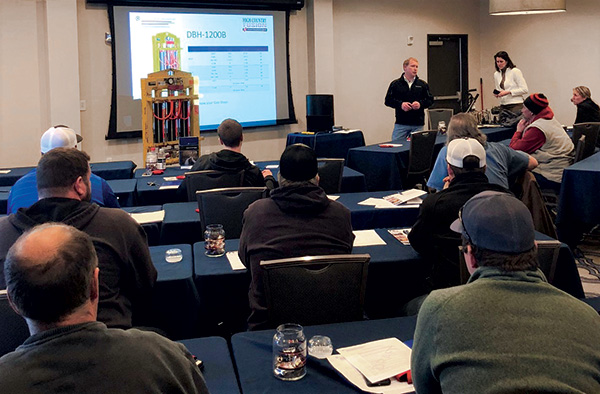December 2019, Vol. 246, No. 12
Plastic Pipe Report
PPI Provides Midstream Workforce with Chance to Learn About Plastic Pipes
By Randy Knapp, Director of Engineering, Energy Piping Systems Division, Plastics Pipe Institute, Inc.
If you’re like most in industry, you’ve had a difficult time finding the right people for your organization. As employment growth continues across much of the U.S., many companies are finding it increasingly difficult to hire people with the right skill set.

The energy sector is no different and the situation is more severe because the United States is now one of the leading petroleum producers in the world and has recently become a net exporter of energy.
According the 2019 U.S. Energy and Employment Report, hiring difficulty was highlighted by virtually all sectors as a growing problem. Just under 77% of employers across energy sectors reported difficulty hiring qualified workers during the last 12 months, an increase of nearly seven percentage points from 2017. Almost 30% noted it was very difficult (vs. 26% in 2017).
Either lack of experience, training, or technical skills was almost universally cited as the top reason for hiring difficulty by employers across all five energy sectors. The need for technical training and certifications were also frequently cited, implying the need for expanded investments in workforce training and closer coordination between employers and the workforce training system.
High-density polyethylene (HDPE), polyamides (PA-11 and PA-12), and composite pipes have made it possible for the rapid expansion of oil and gas gathering activities in shale plays across the U.S. These products provide millions of gallons of fresh or recycled water for fracking operations and remove just as much untreated well water safely and efficiently.
There is no room for failure of this critical infrastructure because pressures in an HDPE pipeline can reach 300 psi and temperatures up to 180 degrees F, and pressures in composite pipelines can reach well over 1,000 psi. HDPE and composite piping provide proven and robust systems but require skilled designers and installers to ensure their proper application and installation.
At the same time, the oil and gas industry is bracing for new federal regulations. On March 17, 2016, the Pipeline and Hazardous Materials Safety Administration (PHMSA) sent out a notice of proposed rulemaking. The so called Mega Rule” included new proposed regulations of transmission and gathering systems. Since that time, PHMSA has broken off “gathering” as a separate rulemaking entity.
The recent Gas Piping Advisory Committee (GPAC) meetings on the topic of gas gathering were concluded in June, and all are now anxiously awaiting PHMSA’s final rule on Class 1 gathering systems. The additional regulations are likely to exacerbate the need for skilled labor and require that installers have addition training and qualification.
Industry growth, lack of experienced labor and increasing regulation of oil and gas gathering point to the need to provide technical training for the industry. Nowhere is that truer than training in the proper design and application of plastic piping.
Unfortunately, there are not a lot of options for designers and installers to learn about plastics. There is a dearth of colleges and universities offering engineering programs on plastics and even fewer trade schools offering programs focused on the plastics knowledge and skill needed by exploration and gathering companies.
The Plastics Pipe Institute, Inc. (PPI) has recognized this growing need. In 2018, PPI’s Energy Piping Division provided the first field seminar for midstream company employees in the Bakken shale play. The two-day seminar provided by PPI in cooperation with the North Dakota Petroleum Council included more than 40 participants from various midstream energy companies and state regulators.
The course was presented by a collection of plastic industry experts from PPI member companies and included sessions on basic polymers, plastic system design, spoolable composites, installation, and fusion training resulting in a fusion certificate provided by McElroy Manufacturing.
In 2019, PPI expanded its seminar offering to the Permian Basin, providing a session in cooperation with Midland Community College in Texas, and again held a seminar in Williston, N.D. PPI also has plans to provide individual company seminars to help educate engineers and designers in the best practices.
Surveys from each seminar indicate a strong desire for additional seminars and self-guided courses. In 2020, PPI’s education offering will expand again with plans to offer seminars in different producing regions across the country.
Knowing that face-to-face seminars provide a somewhat limited opportunity to reach the thousands who would benefit from the training across the industry, PPI has decided to launch its own Learning Management System (LMS) program to provide online training to a much larger segment of the industry.
The PPI Energy Division is now in the process of developing its first course to provide an introduction to polyethylene piping and is developing a scope and sequence of courses about HDPE and composite systems for oil and gas that will be designed to provide critical knowledge to installers and designers.
PPI plans to expand the online course offering and hopes to eventually provide full plastics curriculum and certificate programs.
To make sure the focus is on the appropriate courses and formats, PPI is establishing an Oil and Gas Advisory Board to be comprised of midstream and upstream company representatives. This advisory group will be utilized to help plan curriculum and ensure that the needs of the oil and gas gathering industry are met well into the future.
Closer collaboration between oil and gas industry employers, manufacturers, trade associations, trade schools, colleges and universities will be critical to successfully developing the workforce talent needed for current and growth in the future.
PPI is excited to play a key role in helping to educate and develop our industry. P&GJ





Comments